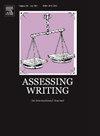任务重复时间表和情绪对二语写作表现的影响
IF 5.5
1区 文学
Q1 EDUCATION & EDUCATIONAL RESEARCH
引用次数: 0
摘要
本研究采用潜在转换分析(LTA)来识别基于CALF测量(句法复杂性、准确性、词汇复杂性和流畅性)的不同二语写作表现特征,并检查不同任务重复计划下情绪状态的影响。参与者包括270名参加美国大学写作课程的ESL本科生,他们被随机分配到长间隔、短间隔和大量重复计划中。每个人都完成了一项有说服力的写作任务,然后是一份测量焦虑和快乐程度的问卷。结果表明,学习者最初表现出相似的表现水平,但最终形成了两种表现:低表现和高表现。长间隔组的人更有可能属于更高的表现,其特征是更高的CALF测量,特别是在句法复杂性、准确性和词汇复杂性方面。在三种类型的任务重复计划(长间隔、短间隔和大量重复)和两种与任务相关的情绪(享受和焦虑)的预测因子中,感知到的享受是被分类为高绩效Profile的最强预测因子。这些发现强调了利用以人为本的方法来探索二语写作轨迹的个体差异的重要性,并表明精心设计的任务重复时间表和对情绪状态的关注可以提高写作表现。本文章由计算机程序翻译,如有差异,请以英文原文为准。
Impact of task repetition schedules and emotions on L2 writing performance profiles using latent transition analysis
This study employed Latent Transition Analysis (LTA) to identify distinct L2 writing performance profiles based on CALF measures (Syntactic Complexity, Accuracy, Lexical Complexity, and Fluency) and to examine the influence of emotional states under varying task repetition schedules. Participants included 270 ESL undergraduates in a U.S. university writing course, and they were randomly assigned to long-spaced, short-spaced, or massed repetition schedules. Each completed a persuasive writing task, followed by a questionnaire measuring anxiety and enjoyment. Results indicated that learners initially displayed similar performance levels but ultimately formed two profiles: Lower Performance and Higher Performance. Those in the long-spaced group were more likely to belong to the Higher Performance Profile, characterized by higher CALF measures, particularly in syntactic complexity, accuracy, and lexical complexity. Among the predictors—three types of task repetition schedules (long-spaced, short-spaced, and massed repetitions) and two task-related emotions (enjoyment and anxiety)—perceived enjoyment emerged as the strongest predictor of being classified into the Higher Performance Profile. These findings emphasize the importance of utilizing a person-centered approach to explore individual differences in L2 writing trajectories and suggest that carefully designed task repetition schedules and attention to emotional states can enhance writing performance.
求助全文
通过发布文献求助,成功后即可免费获取论文全文。
去求助
来源期刊

Assessing Writing
Multiple-
CiteScore
6.00
自引率
17.90%
发文量
67
期刊介绍:
Assessing Writing is a refereed international journal providing a forum for ideas, research and practice on the assessment of written language. Assessing Writing publishes articles, book reviews, conference reports, and academic exchanges concerning writing assessments of all kinds, including traditional (direct and standardised forms of) testing of writing, alternative performance assessments (such as portfolios), workplace sampling and classroom assessment. The journal focuses on all stages of the writing assessment process, including needs evaluation, assessment creation, implementation, and validation, and test development.
 求助内容:
求助内容: 应助结果提醒方式:
应助结果提醒方式:


